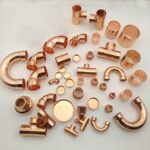Chiller Pumps
Chiller Pumps, also known as condenser water pumps or circulation pumps, are essential components in chiller systems. Their primary function is to circulate water or a water-based solution (such as glycol) through the chiller’s condenser and evaporator loops. This circulation is crucial for transferring heat between the chiller, the cooling load (such as air handling units or process equipment), and the condenser where heat is rejected.

Chiller Pumps
Advantages and Role of
- Efficient Heat Transfer: Chiller pump ensure consistent and efficient circulation of cooling water or fluid through the chiller’s evaporator and condenser coils, optimizing heat transfer.
- Energy Efficiency: By maintaining proper flow rates and pressures, chiller pumps contribute to energy savings by ensuring the chiller operates at peak efficiency.
- System Reliability: They help maintain stable operating conditions within the chiller system, which enhances overall system reliability and reduces downtime.
- Flexibility: Chiller pump are designed to handle varying flow rates and pressures, making them adaptable to different chiller system configurations and cooling requirements.
- Reduced Maintenance: Proper circulation provided by chiller pumps can contribute to reduced maintenance needs and longer equipment lifespan by minimizing strain on components.
- Improved Performance: They enable the chiller to achieve and maintain desired cooling capacities and temperatures consistently.
Chiller Pumps
Functions of
- Circulation: Chiller pump circulate water or a water-based fluid (such as glycol) through the chiller’s evaporator and condenser loops. This circulation is essential for transferring heat between the chiller, where heat is absorbed from the cooling load, and the condenser, where heat is rejected to the environment.
- Heat Transfer: By maintaining a continuous flow of coolant through the chiller’s heat exchangers, chiller pumps facilitate efficient heat transfer. In the evaporator, heat is absorbed from the chilled water or process fluid, while in the condenser, heat is released to the cooling medium (air or water).
- Pressure Maintenance: Chiller pump ensure that the coolant flows at the required pressure levels throughout the chiller system. Proper pressure maintenance is critical for optimizing heat transfer efficiency and ensuring the chiller operates within its designed parameters.
- Optimizing Performance: They help optimize the performance of the chiller by maintaining appropriate flow rates and pressures, which directly impacts the chiller’s cooling capacity and energy efficiency.
Other Chiller Spares We Manufacture
Scroll Compressor
A scroll compressor is a type of positive displacement compressor that uses two interleaved spiral-shaped scrolls to compress gas. One scroll is stationary,

Semi-hermetic Compressor
A semi-hermetic compressor is a type of compressor where the motor and compressor are enclosed in a single, sealed housing, but unlike fully hermetic compressors,
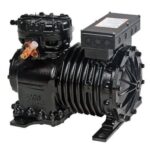
Hermetic Compressor
Hermetic Compressor is a type of compressor widely used in refrigeration and air conditioning systems. It features an airtight housing that encloses both the motor and the compressor,
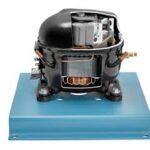
Screw Compressor
Screw Compressor is a type of rotary compressor that uses two intermeshing helical rotors to compress gas or air. As the rotors rotate, they trap and compress the gas
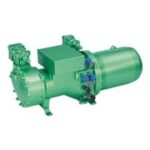
Reciprocating Compressor
A reciprocating compressor is a positive displacement device that compresses gas by using a piston driven by a crankshaft. The piston moves back and forth in a cylinder
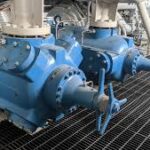
Rotary Compressor
Rotary Compressor is a type of gas compressor that uses a rotating mechanism, such as screws, vanes, or scrolls, to compress gas. The rotating elements trap and compress
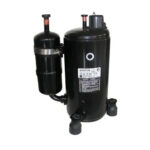
Refrigeration Gases
Refrigeration Gases, also known as refrigerants, are substances used in refrigeration systems to transfer heat from one area to another through a cycle of evaporation and condensation.
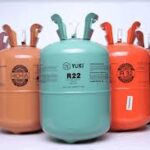
Axil Fan
Axil Fan is a type of mechanical fan commonly used for moving air or gas parallel to the axis of its blades. Unlike centrifugal fans that generate airflow perpendicular to the fan blades
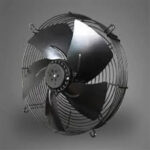
Condenser
Condenser is a key component in refrigeration and air conditioning systems that facilitates the transfer of heat absorbed by the refrigerant to the outside environment.
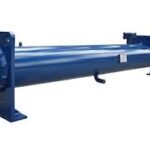
Chiller Control Panel
Chiller Control Panel is a centralized component of a chiller system that oversees and regulates the operation of key components such as compressors, pumps
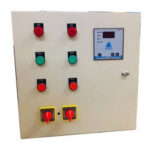
Expansion Valves
Expansion Valves are mechanical devices used in refrigeration and air conditioning systems to regulate the flow of refrigerant into the evaporator. They maintain a controlled reduction

Copper Pipes and Fittings
Copper Pipes and Fittings are commonly used in plumbing and HVAC systems due to their durability, corrosion resistance, and excellent heat transfer properties.
